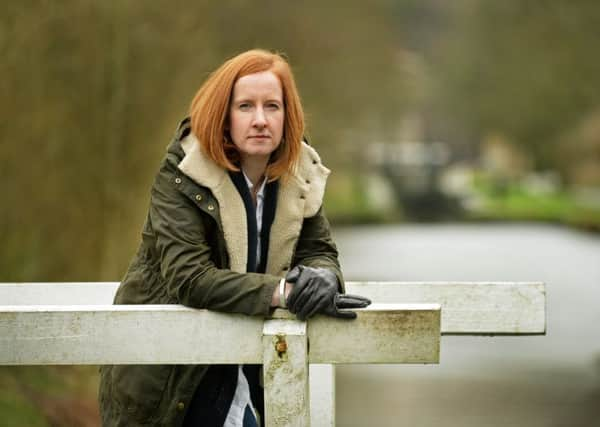All aboard Yorkshire's only floating theatre company


There are some worries shared by most artistic directors of theatre companies. Right at the top is funding, swiftly followed by the annual headache of programming a tour and whose turn it is to buy the biscuits. Not many though can claim to have sleepless nights about members of the cast falling overboard and whether the company narrowboat will make it through the next season without costly repairs.
“Yes, it’s not your average theatre company,” says Marianne McNamara, who as well as being artistic director of Mikron Theatre is also a master in the art of understatement. The seeds of the company, which has its base in Marsden, were sown back in 1963 when jobbing actor Mike Lucas decided his mission was to take theatre to unusual venues and new audiences. The narrowboat came a decade or so later, when Lucas realised that travelling by canal would give him access to the kind of places that were too “out of the way” for regular touring companies. Tysley, the Grand Union Carrying Company narrowboat, has been Mikron’s floating home ever since. McNamara stepped on board 14 years ago as an actor and never left.
Advertisement
Hide AdAdvertisement
Hide Ad“I’ve never felt as at home anywhere else as I have here,” she says.


“It is a massive commitment and when anyone approaches us about joining Mikron we have what we call the putting-off phonecall. We don’t want to dampen anyone’s enthusiasm, but it isn’t like joining the cast of any other production.
“You have to be prepared to live in the close confines of the boat, you have to be prepared to work the locks and while you’re doing it you have to be prepared for people who recognise the boat and just want to stop and chat for a while. Being in Mikron isn’t just a job, it’s a way of life.”
It doesn’t end there. As well as being accomplished singers and musicians, with a typical Mikron tour including venues as various as inner city allotments to fish and chip shops, cast members are also expected to help set out the chairs, take the the ticket money and help flog the company’s merchandise.
Advertisement
Hide AdAdvertisement
Hide Ad“When we hold auditions, one of our team is effectively a mystery shopper who observes how potential cast members behave and react to other people when they are not directly in the spotlight, because for us how they interact with members of the public is just as important as what they do on stage.


“It is much more of a sociable atmosphere than you get at any other theatre production and the audience tends to be very close. That’s lovely in creating a really feeling of intimacy, but it does mean that you have to be prepared if someone falls asleep in the first row.”
With Tysley recently having undergone a refurb, this year’s company will have the unimagined luxury of fitted carpet, but all will still have to abide by the one houseboat rule.
“You quickly learn that it’s in everyone’s best interest not to feed the swans,” says McNamara, who worked in theatre in education before auditioning for Mikron. “The first time you step onboard, you think, ‘isn’t this idyllic, how lovely to be sat on a sunny afternoon feeding the swans’, but feed them once and they will never leave you alone. Ever.”
Advertisement
Hide AdAdvertisement
Hide AdAs artistic director and a mother-of-three, McNamara is now largely land based, and can usually be found behind a mound of paperwork rather than navigating through a tricky lock system.
Against the backdrop of successive arts funding cuts, many theatre companies are now looking at innovative ways they can increase income. It’s something Mikron has been doing since the company was founded. While there are some ticketed shows, often the audience is invited to pay what they feel and the coffers are further boosted by sales of that merchandise, which includes jigsaws, playing cards and canvas bags.
“It’s really not been plain sailing,” says McNamara, apologising for the watery figure of speech. “A few years back we lost our local authority funding which was a huge blow and we did wonder whether we should call it a day.
“One of the reasons we didn’t was because our 40th anniversary was approaching and we thought it would be such a shame, given all the hard work which had gone into the company, if we didn’t at least reach that landmark. Collectively we decided to give it one last shot and the Ruby Appeal was launched.
Advertisement
Hide AdAdvertisement
Hide Ad“The response was incredible. The very next day we began receiving envelopes containing cheques for £5 and £10. Soon there were hundreds of them. If ever we needed evidence that Mikron needed to continue that was it.”
The fundraising effort bought Mikron some time and McNamara admits that over the last five years the company has been forced to become more businesslike.
“I have had to get to grips with filling out pages and pages of funding application forms and yes, I now spend a lot of my time pouring over audience data. That might not be quite as fun as appearing in a Mikron show, but you know what it’s a really good feeling to be able to absolutely justify the work you do. There are hundreds of theatre companies competing for the same ever decreasing pot of money and it’s right that you have to be able to present a persuasive argument as to why you deserve it more than someone else.”
A typical Mikron production takes a key moment or period in British history and retells it from the viewpoint of ordinary people. Next up is In At the Deep End, inspired by the RNLI, and Best Foot Forward which celebrates the Youth Hostel movement.
Advertisement
Hide AdAdvertisement
Hide Ad“I’ll admit that I took a little bit of convincing that a show about youth hostelling would work, but actually there are so many parallels between it and us. The YHA is all about freedom, it was set up to make the outdoors accessible and to make holidaying affordable to all.
“It’s been written by Maeve Larkin, who is a bit of a Mikron stalwart. She knows what works not just dramatically but also what works for us and our audiences. Best Foot Forward opens in the 1960s with a young couple whose relationship is still in its early days. They are about to go on their first holiday and Shirley is sure that Trevor is going to whisk her off abroad. Instead they end up in a Youth Hostel. It’s so typically Mikron.”
Along with In at the Deep End, Mikron will take in 150 venues during the 2017 touring season and if they can equal last year’s average 89 per cent capacity – a figure many other theatres would die for – the company’s future looks assured.
“We are always planning two or three years ahead. There’s a list of topics which we think would provide us with good material and creeping up to the top is the NHS. However, a few years after we tackled the Post Office, a whole load of branches ended up closing, and we don’t really want to be held responsible for breaking the NHS.”
Advertisement
Hide AdAdvertisement
Hide AdBest Foot Forward opens at York YHA on March 30 and tours the country from March to October. In at the Deep End will also be performed at a number of Yorkshire venues, including the RNLI Lifeboat Station in Scarborough on May 24. For full details go to mikron.org.uk